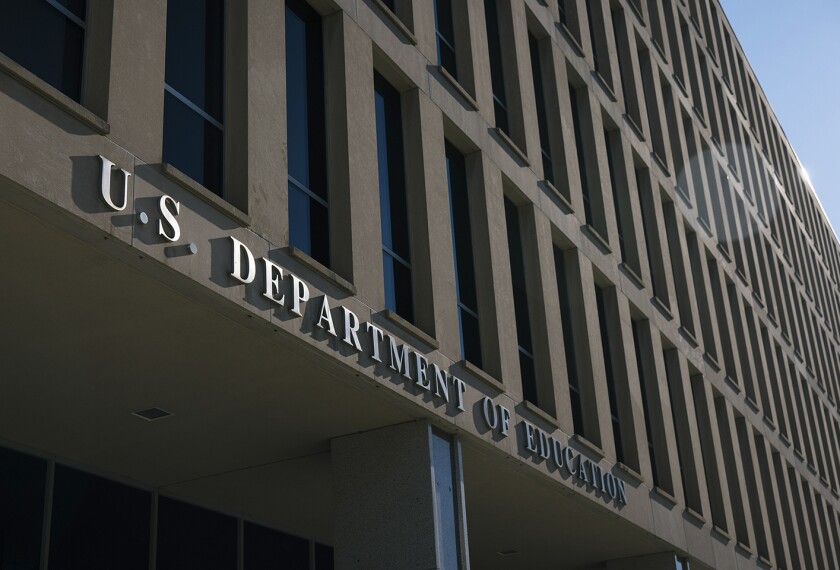As Congress works toward reauthorizing the No Child Left Behind Act, President Bush said for the first time last week that he’s willing to reject any bill he doesn’t like.
“Any effort to weaken [the] No Child Left Behind Act will get a presidential veto,” Mr. Bush said on Oct. 15 at a town-hall-style meeting in Rogers, Ark. “I believe this piece of legislation is important, and I believe it’s hopeful, and I believe it’s necessary to make sure we got a [sic] educated group of students who can compete in the global economy when they get older.”
The next day, Senate aides distributed draft language of large sections of a potential NCLB bill, the first such specific reauthorization language put forth by key lawmakers in that chamber. The draft provisions did not address contentious issues such as the law’s accountability rules, teacher pay incentives, and students’ eligibility for tutoring under the law.
Aides to the Senate Health, Education, Labor, and Pensions Committee distributed the draft provisions to lobbyists for comments. Sen. Edward M.Kennedy, D-Mass., the committee’s chairman, and Sen. Michael B. Enzi of Wyoming, the ranking Republican, both endorsed the legislative language.
“Chairman Kennedy is pleased that progress has been made, working with committee members, on many issues related to this reauthorization,” Melissa Wagoner, a spokeswoman for Sen. Kennedy, said in an Oct. 17 statement. “The draft legislative language released yesterday includes many improvements to current law, but much remains to be done on key issues, including accountability and teacher quality.”
In the House, meanwhile, a comprehensive draft NCLB bill has been circulating since late summer, sparking much debate about its provisions. Leaders of the House Education and Labor Committee have not announced a timetable for considering a formal NCLB bill. But key Democrats and Republicans met privately last week to hash out their differences over sections of that “discussion draft.”
Time Running Out
President Bush has said several times that he wants the NCLB law—a centerpiece of his first-term domestic agenda—renewed this year. Last week marked the first time he said he would veto a reauthorization bill that did not include the accountability rules and school choice measures that he favors.The president and Secretary of Education Margaret Spellings have said they don’t want to change the law’s focus on students’ achievement on state tests in reading and mathematics.
The House draft bill would allow states to consider test scores on other subjects and other educational data when determining whether schools and districts had made adequate yearly progress.
Both chambers of Congress are working to approve a bill to reauthorize the nearly 6-year-old NCLB law by the end of the year. Although the law does not formally authorize spending for its programs beyond fiscal year 2007, it included an automatic extension for fiscal 2008, which began Oct. 1.
Even with the extension, many lawmakers and education advocates want a bill to renew the law in place before the president leaves office in January 2009. With the political world increasingly focused on the 2008 presidential race, Congress is running out of time to ask members to deal with education policy issues such as adequate yearly progress, annual testing, and other arcane details of the law.
The leaders of the House and Senate education committees already have fallen behind their schedules for reauthorization. Before Congress returned from its August recess, Sen. Kennedy said he wanted his education panel to pass an NCLB bill by the end of September. Likewise, Rep. George Miller, D-Calif., the chairman of the House education committee, said his goal was for his panel to approve a bill in September, with the full House passing it by the end of the year.
Both missed their September deadlines and appear to be running short of time for serious work by the end of the year. Congress may shut down for the year as early as Thanksgiving.
Consensus Lacking
And, lawmakers still haven’t reached consensus on critical NCLB issues. Last week, the co-chairmen of the Congressional Black Caucus’ education committee wrote to House members to say they endorsed major elements of the House draft bill, especially a proposal to allow “growth models” for calculating adequate yearly progress, or AYP, and a plan to help schools based on how far short they fell of their AYP goals.
The Oct. 16 letter from Rep. Robert C. Scott, D-Va., and Rep. Danny K. Davis, D-Ill., responded to an Oct. 4 letter to all House members from Rep. Albert R. Wynn, D-Md. Rep. Wynn, also a member of the black caucus, said he had “strong concerns” about the House draft’s continued reliance on standardized tests and about proposals to experiment with pay-forperformance programs for teachers.
The letters shows that Democrats remain divided over important issues under the NCLB law. Meanwhile, Republicans are objecting to several components of the House draft bill, saying that the proposed changes would make it too easy for schools to meet AYP goals, and that the plan would curtail students’ access to tutoring and school choice. (“Bush, Others Want Law to Go Beyond Basics,” Oct. 17, 2007.)
Also last week, the Department of Education’s office of inspector general listed a series of issues it believes Congress should address in the reauthorization. In a 38-page “perspective paper,” (requires Micrsoft Word) the watchdog office said that Congress should act to ensure that the department adequately monitors states’ and districts’ compliance with the law, and that the quality of data on student progress is “valid and reliable.”
Citing an earlier report from the inspector general, the paper said that the Education Department “did not adequately monitor” districts’ and schools’ implementation of tutoring and school choice.




